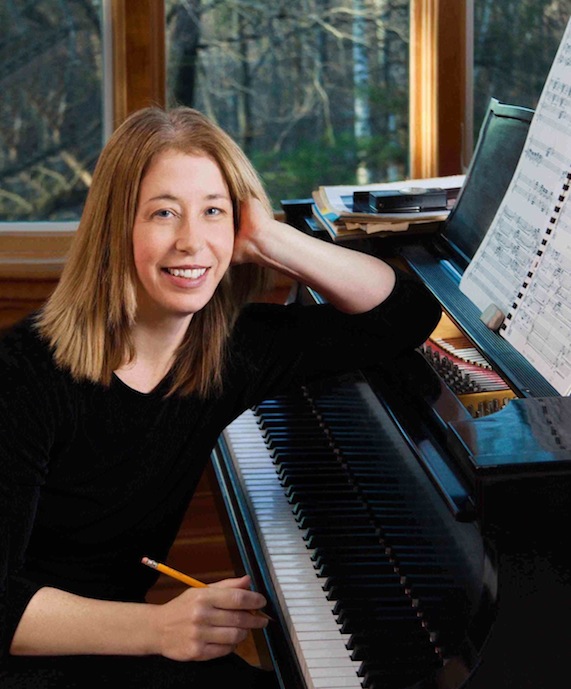Cantata Singers give life to premiere of thought-provoking “Eve”
In their season-opening program Saturday night at Jordan Hall, the Cantata Singers paired two cantatas by Bach alongside the world premiere of a new work by Boston-based composer Elena Ruehr.
Programs of this type have graced many a Cantata Singers concert in their fifty years of operation, and the ensemble, led by David Hoose, has a sterling reputation for combining commissioned pieces with Classical and Baroque repertoire for enriching concert offerings.
Ruehr’s cantata, Eve, a Cantata Singers commission, made for a delightful and thought-provoking opener. Scored for chorus, orchestra, and soprano and bass soloists, the work draws its text from the third chapter of Genesis, which concerns the buildup to the fall of mankind into sin after eating of the apple from the forbidden tree in the Garden of Eden. But rather than simply retelling this well-worn story, Eve poses an honest question: was gaining knowledge of good and evil such a terrible thing? “In a sense,” the composer stated in her program note for the work, “[Eve] is choosing light over darkness, sight over blindness. It’s an astonishing idea.”
Indeed it is, and Ruehr’s work brings the question forcefully and affectingly to life. The piece begins with glassy harmonies in the strings with serpentine woodwind lines winding their way through dissonances that are left to shimmer in the balance. As the music becomes more agitated, the choir enters in waves of statements to set the scene in the Garden of Eden.
Bass Will Prapestis was an effective serpent. Through his seductive and warbling melodies, he enticed the first woman to eat of the apple. Soprano Farah Darliette, with her glittering and clear voice, captured the innocent curiosity of Eve.
Ruehr’s music does its part to tell the story, with the chorus and orchestra spinning webs of slithery lines to underscore the serpent’s insistence that eating of the fruit will grant God-like knowledge to Eve. The most arresting moments in the score come at work’s end as Eve shares the apple with Adam. There, the chorus intones the phrase “and the eyes of them both were opened.” Singers and orchestra fuse their lines together into unresolved dissonances, which seem to cast a light on the uncertain future that will result from that climactic moment.
The Cantata Singers sang with clear diction and sensitive phrasing of the score’s declamatory phrases. Hoose led the orchestra and chorus with deliberation, making a strong case for Ruehr’s work.
The concert began with Bach’s Cantata “Du sollt Gott, deinen Herren, lieben,” and featured the Cantata Singers in some sumptuous singing. The lines of the work’s opening chorus layered upon one another for a rich tonal blend. The final chorale, “Herr, durch den Glauben wohn in mir,” sounded with stately grace.
Some of the most energetic singing came in the choruses of the evening’s other Bach offering, the wedding Cantata “Dem Gerechten muβ das Licht immer wieder aufgehen.” The churning phrases of the opening chorus were joyous and delivered with glowing intensity. The lines of “Wir kommen, deine Heiligkeit,” the central movement, were radiant, with finely chiseled phrases traded between the chorus and vocal quartet (soprano Lisa Lynch, mezzo-soprano Jennifer Webb, tenor Eric Christopher Perry, and bass Mark Andrew Cleveland).
The soloists, drawn from the Cantata Singers’ ranks, ranged from capable to excellent. Soprano Hannah McMeans’ delicate voice well suited the trickling lines of her aria “Mein Gott, ich liebe dich von Herzen” in the opening cantata. Alto Carola Emrich-Fisher sang “Ach, es bleibt in meiner Liebe” with a creamy tone, though her singing was sometimes drowned out by the warmly played solo trumpet.
In the second cantata, bass Dana Whiteside lofted his lines in the aria “Rühmet Gottes Güt und Treu” with bell-toned clarity. Eric Christopher Perry sang with a smooth silky tenor in the recitative “Hochedles Paar.” But the standout of the evening was Jennifer Webb, who delivered a velvety and most affecting aria “Auf und rühmt des Höchsten Güte.”
The unsung heroes of the evening were the members of the orchestra. The strings supplied a soft cushion of accompaniment to support the singers. Flutists Christopher Krueger and Vanessa Holroyd spun fluttering counter melodies around soprano Lisa Lynch in her light-footed recitative in “Dem Gerechten.” Trumpets Terry Everson, Eric Berlin, and Greg Whitaker added glorious sound to the choruses. Through it all, David Hoose guided with a steady hand and a sensitive interpretation of the music.
The next Cantata Singers program will feature Rachmaninoff’s All-Night Vigil 8 p.m. January 24 at St. Paul’s Church, Cambridge and January 31 at Houghton Chapel, Wellesley College. cantatasingers.org.
Posted in Performances
